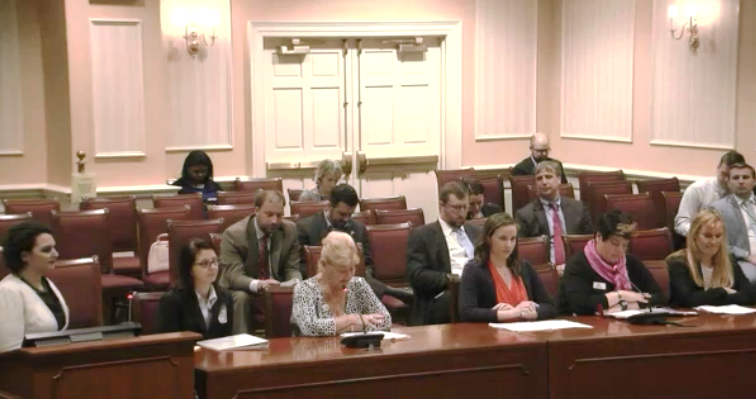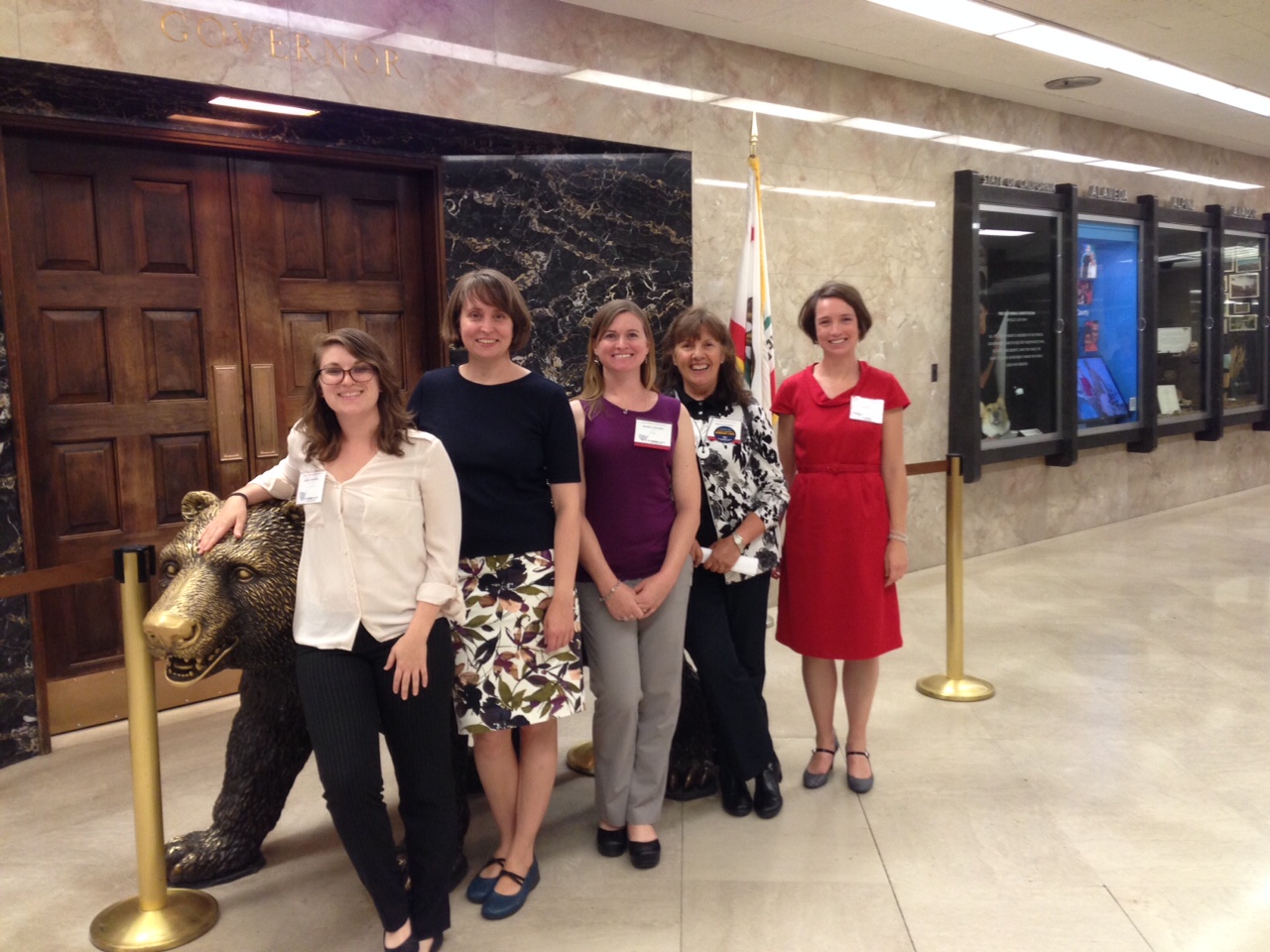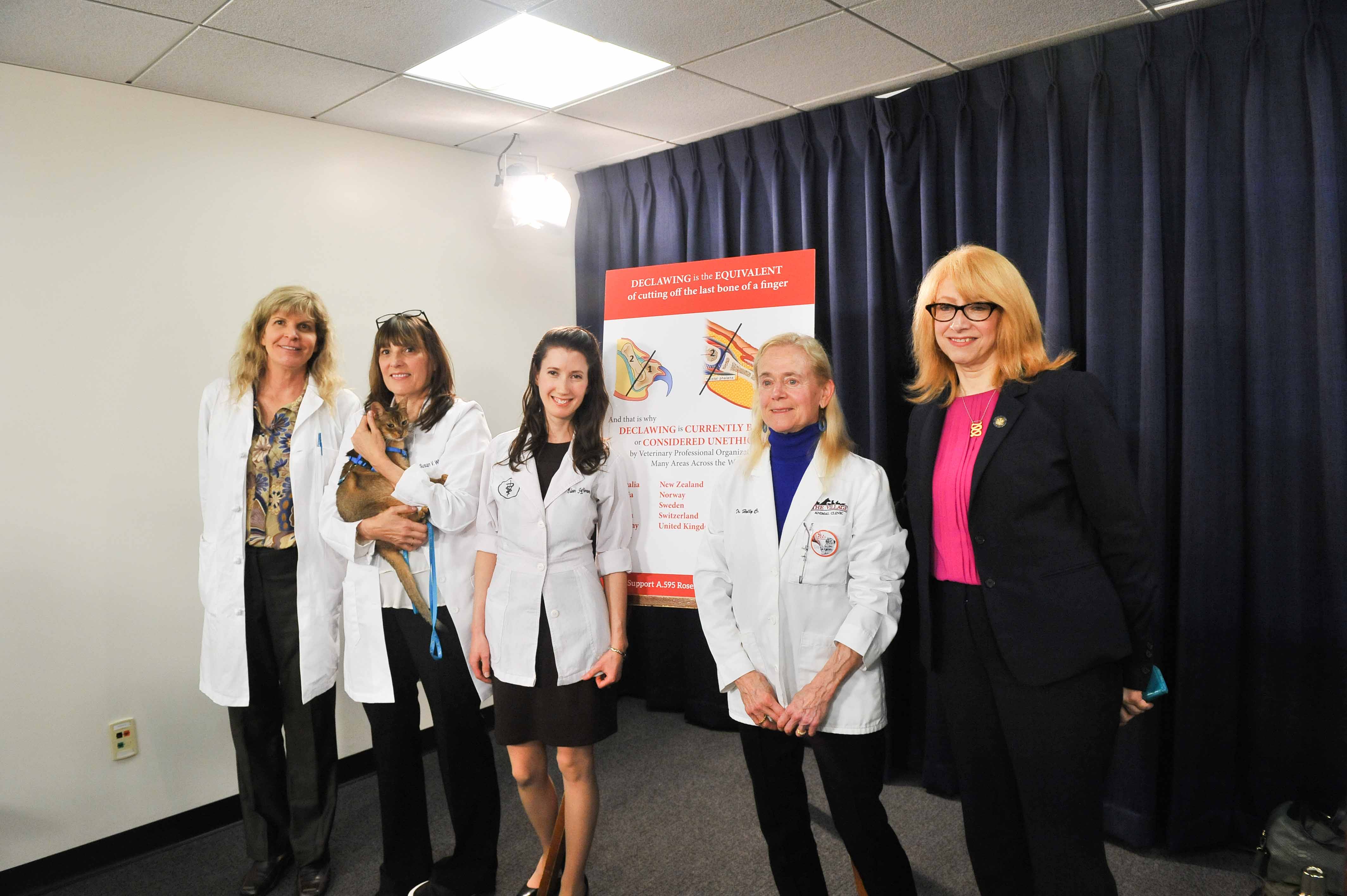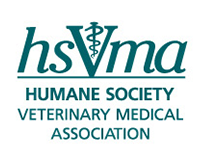|
HSVMA ADVOCACY IN ACTION 2017
By Barbara Hodges, DVM, MBA, HSVMA Veterinary Advisor
During 2017, more than 1,000 veterinary professionals joined HSVMA in actively advocating for advancements in animal welfare nationwide. Our members--including veterinarians, veterinary technicians, veterinary medical students and veterinary technician students—in concert with our leaders, our State Representatives, our veterinary advisors, our staff, and, at times, with other like-minded stakeholder groups, worked diligently throughout the year to achieve our welfare goals. Legislatively we advocated on the local, state and federal levels, reaching out within the veterinary profession and to elected representatives—a number of whom are veterinarians themselves.
Priorities for Federal, State and Local Advocacy
This year we focused our legislative efforts in four priority areas: (1) supporting mandatory veterinary reporting of animal cruelty, (2) ending extreme confinement of farm animals, (3) eliminating the pipelines from animal ‘mills’ to pet stores, and (4) protecting wildlife from harm and inhumane methods of hunting and trapping.
 Mandatory Veterinary Reporting of Suspected Animal Cruelty, Abuse, Neglect and Fighting Mandatory Veterinary Reporting of Suspected Animal Cruelty, Abuse, Neglect and Fighting
- One of HSVMA’s key legislative victories for the year was a new Maryland law (HB 1463) that requires that veterinarians report suspected animal abuse and fighting. In exchange for their reports, veterinarians will be granted immunity from liability. HSVMA helped move this bill forward by submitting a support letter, collecting veterinary endorsements and having our Maryland State Representative, Dr. Rhonda Smetana, testify in support of the bill at a Senate committee hearing. The bill was approved by the Maryland legislature in May and was swiftly signed by the Governor; it takes effect in October 2017.
- In New York, HSVMA supported similar legislation (A.4904/S.621), submitting a support letter and gathering veterinary endorsements. Although the legislation was not passed, momentum was built for this reform and there are plans to amend the bill and reintroduce it during the 2018 session.
Farm Animal Protections: Ending Extreme Confinement, Improving Welfare
- In Rhode Island, HSVMA supported legislation (H.6023) to end the battery cage confinement of laying hens. The state had already banned pregnant sow gestation crates and veal calf crates in 2012. This bill would have also ended the sale of agricultural products derived from animals subjected to these inhumane practices. HSVMA submitted a support letter and gathered veterinary endorsements from nearly 25% of the veterinarians in the state. HSVMA also had representatives speak with the legislature and the media in support of the legislation. Although the legislation did not move forward this session, the effort did generate significant public awareness as well as support for this reform and plans are underway to introduce the bill again in 2018.
 Companion Animal Protections: Eliminating Puppy-Mill-to-Pet-Store Pipelines Companion Animal Protections: Eliminating Puppy-Mill-to-Pet-Store Pipelines
- In California, HSVMA supported a bill (AB 485) to require that pet stores source dogs, cats and rabbits exclusively from shelters and rescue organizations. We submitted a support letter and an HSVMA lobbying team spent a full day meeting with legislators and staff at the state capitol in Sacramento providing veterinary expertise on the welfare issues associated with puppy mills and pet store sales. The bill was approved by the California Legislature and is awaiting a signature from Governor Jerry Brown in September 2017.
- In New Jersey, HSVMA supported a bill (S.3041) to better regulate puppy mills and pet shops. This bill was passed by the New Jersey Legislature but unfortunately it was vetoed by Governor Chris Christie.
Wildlife Protections: Ending Inhumane Hunting, Trapping and Predator Control Methods
- HSVMA was joined by veterinary members in 10 key states in opposing an effort to overturn recently implemented protections (S.J. Res. 18) of native Alaska wildlife from extreme forms of trapping and hunting on National Wildlife Refuges. Unfortunately, the protections were overturned by the federal government.
- In Massachusetts, HSVMA supported new anti-poaching and hunting regulations (S.464, H.2918, H.3021) with HSVMA member Dr. Jennifer Maas traveling to the Statehouse in Boston to testify in support. These bills are still moving through the Legislature during 2017.
- In New York we opposed a bill (S.372) that aimed to overturn a ban on the use of cruel snare traps. Unfortunately, it has passed both Houses and is awaiting the Governor Cuomo’s signature.
- In Oregon, HSVMA supported a bill (Senate Bill 6) that would improve trapping regulations with a support letter written by HSVMA State Representative, Dr. Katie Bahr, published in The Bend Bulletin. The bill was in a Senate committee when the Legislature adjourned.
- In California HSVMA submitted a letter supporting reductions in the use of certain rodenticides and pesticides because of their negative secondary effects on wildlife (AB 1687). This legislation is in the committee process.
- We also supported California legislation (AB 8) allowing for the use of non-lethal alternatives by the state Department of Fish & Wildlife when conducting mountain lion depredation. This bill is moving through the committee process.
- In Connecticut, HSVMA State Rep, Dr. Melissa Shapiro, worked on the local level to encourage the use of non-lethal methods of predator control for coyotes in her community.
Additional Legislative Welfare Advocacy
 Other state legislation HSVMA supported included anti-bestiality bills in Texas (SB 1232), West Virginia (HB 2664), and Vermont (H.325); bills to ban traveling animal acts in Maine (LD 396), Hawaii (administrative rule change) and New York City (Int. No. 1233); bills to ban exotic pets in Kansas (HB 2776/ SB 162) and Texas (HB 2774/SB 1879); a Massachusetts bill (S 489/H 3232) to require that animals used in research have the chance for adoption; elephant protection legislation (S.2098) in New York, and a bill to ban cat declawing in New York (A. 595). Other state legislation HSVMA supported included anti-bestiality bills in Texas (SB 1232), West Virginia (HB 2664), and Vermont (H.325); bills to ban traveling animal acts in Maine (LD 396), Hawaii (administrative rule change) and New York City (Int. No. 1233); bills to ban exotic pets in Kansas (HB 2776/ SB 162) and Texas (HB 2774/SB 1879); a Massachusetts bill (S 489/H 3232) to require that animals used in research have the chance for adoption; elephant protection legislation (S.2098) in New York, and a bill to ban cat declawing in New York (A. 595).
On the federal level, HSVMA supported restoration of public access to all USDA database records related to the Animal Welfare Act and the Horse Protection Act, and expressed support for all animal welfare laws enforced by the USDA. We also opposed the re-opening of any horse slaughter plants in the United States and supported the reintroduced Prevent All Soring Tactics (PAST Act) to help end the cruel practice of soring.
##
|

 Mandatory Veterinary Reporting of Suspected Animal Cruelty, Abuse, Neglect and Fighting
Mandatory Veterinary Reporting of Suspected Animal Cruelty, Abuse, Neglect and Fighting Companion Animal Protections: Eliminating Puppy-Mill-to-Pet-Store Pipelines
Companion Animal Protections: Eliminating Puppy-Mill-to-Pet-Store Pipelines Other state legislation HSVMA supported included anti-bestiality bills in Texas (SB 1232), West Virginia (HB 2664), and Vermont (H.325); bills to ban traveling animal acts in Maine (LD 396), Hawaii (administrative rule change) and New York City (Int. No. 1233); bills to ban exotic pets in Kansas (HB 2776/ SB 162) and Texas (HB 2774/SB 1879); a Massachusetts bill (S 489/H 3232) to require that animals used in research have the chance for adoption; elephant protection legislation (S.2098) in New York, and a bill to ban cat declawing in New York (A. 595).
Other state legislation HSVMA supported included anti-bestiality bills in Texas (SB 1232), West Virginia (HB 2664), and Vermont (H.325); bills to ban traveling animal acts in Maine (LD 396), Hawaii (administrative rule change) and New York City (Int. No. 1233); bills to ban exotic pets in Kansas (HB 2776/ SB 162) and Texas (HB 2774/SB 1879); a Massachusetts bill (S 489/H 3232) to require that animals used in research have the chance for adoption; elephant protection legislation (S.2098) in New York, and a bill to ban cat declawing in New York (A. 595).